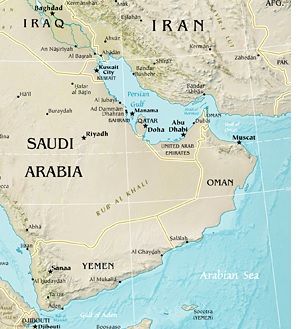On December 11, the Gulf Cooperation Council issued a communique welcoming Tehran’s new efforts to engage with member states. The group -- which includes Bahrain, Kuwait, Oman, Qatar, Saudi Arabia and the United Arab Emirates -- discussed regional developments at a two-day summit in Kuwait. The following are excerpts from the communique on Iran.
Relations with Iran
 The Supreme Council stressed the importance of closer cooperation between the GCC countries and Iran on the basis of the principles of good neighborliness and non-interference in internal affairs, respect for the sovereignty of countries in the region, and to refrain from the use of force, or the threat of the use of force.
The Supreme Council stressed the importance of closer cooperation between the GCC countries and Iran on the basis of the principles of good neighborliness and non-interference in internal affairs, respect for the sovereignty of countries in the region, and to refrain from the use of force, or the threat of the use of force. The Supreme Council welcomed the new trends of the Iranian leadership towards the GCC countries, hoping these trends are followed by concrete steps that would reflect positively on the peace, security and stability in the region.
Iran's Nuclear Program
The Supreme Council welcomed the interim agreement which was signed by the P 5 +1 with Iran on November 24, 2013 in Geneva, as a preliminary step towards a comprehensive and lasting solution to the Iranian nuclear program , that would put an end to concerns on the international and regional level about this program, and enhance the region's security and stability , and contribute to the elimination of all weapons of mass destruction , including nuclear weapons; and the Supreme Council reaffirmed the importance of the strict implementation of the agreement in full under the supervision of international Atomic Energy Agency (IAEA).
Disputed Islands
The Supreme Council renewed emphasis on the continued occupation of the Islamic Republic of Iran of the three islands, Greater and Lesser Tunbs and Abu Musa, which belong to the United Arab Emirates, a point that has been stressed in passed communications. The Supreme Council further emphasized the following:
• Support for the right of sovereignty of the United Arab Emirates over its three islands of Greater and Lesser Tunbs and Abu Musa, and the territorial waters, airspace, continental shelf and exclusive economic zone of the three islands as an integral part of the United Arab Emirates.
• Any decisions, practices or acts carried out by Iran on the three islands are null and void and do not change any of the historical facts and the legal right to the sovereignty of the United Arab Emirates over its three islands.
• We invite the Islamic Republic of Iran to respond to the efforts of the United Arab Emirates to resolve the issue through direct negotiations or resorting to the International Court of Justice.
Faris Al Sulayman, a research assistant at the Woodrow Wilson International Center for Scholars, contributed to this translation.
